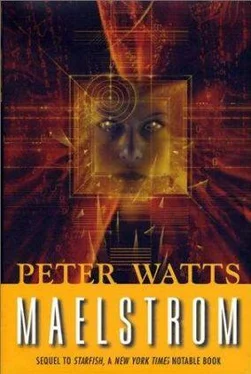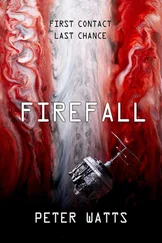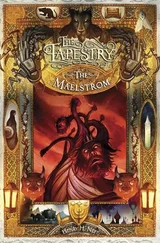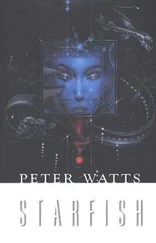The mermaid crouched directly ahead on a jagged reef, a hundred-fifty meters from shore. The ocean, sparkling with microbial phosphorescence, tried to dislodge her. Between waves, the reef jutted a meter above the waterline, myriad tiny waterfalls draining down its sides; when the water crested the mermaid became a round black boulder herself, barely visible in the luminous foam.
She climbed to her feet. The surge rose above her knees; she staggered, but stayed upright. Her face was a pale oval painted onto a black body. Her eyes were paler ovals painted onto her face. They panned past the hovering botfly.
They did not seem to notice it.
Her face tilted down, stared directly ahead. One slick ebony arm reached forward, the fingers extended; a blind woman, reaching for something she couldn't see. Clarke's mouth moved. Any words were lost in the roar of the surf. Perreault slid filters past critical thresholds. Ocean sounds squelched into silence. Now only the shriek of distant gulls and a few syllables:
"No. Not— ain ."
Perreault squelched the high frequencies as well. Now the mermaid stood in an utterly silent tableau, the Pacific crashing soundlessly on all sides.
"You never did," she said. Tide surged silently between her legs. The mermaid's reaching fingers closed around empty space. She seemed surprised.
Another wave swept the reef. The mermaid staggered, recovered. Perreault noticed that both of her hands were balled into fists.
" Dad. " Almost a whisper.
"Ms. Clarke," Perreault said. The mermaid did not respond.
Right. The surf. Perreault increased the volume, tried again: "Ms. Clarke."
The mermaid's head jerked up. " You! What is it? "
"Ms. Clarke, I've been—"
"Something in the food? Some sort of psychoactive? Is that what this is?"
"Ms. Clarke, I don't know what—"
The mermaid smiled, a hideous baring of teeth beneath cold white eyespots. "Fine. I can take it. Do your worst."
"Ms. Clarke—"
"This is fucking nothing . You just wait."
The Pacific surged silently up from behind her, swept her from the reef in the blink of an eye. The cameras caught a last freeze-framed moment: A fist, raised briefly above the boiling water. Gone.
This is fucking nothing. You just wait.
Sou-Hon Perreault didn't know that she could.
The lock groaned open like the gates of an iron cathedral. Earthquakes lived in that sound, twisting metal, skyscrapers torqued painfully on their axes. Slow surge pushed flotsam from great doors that stirred the ocean.
Rising within that sound, another one: triple screws, cavitating.
She'd placed herself a few hundred meters offshore, in the center of a dredged scar leading to deep water. Gray's Harbor's commercial traffic passed directly overhead. By now she'd had enough practice to make it work. She rose a few meters off the bottom; the drag from the new backpack slowed her a bit, but she was getting used to it. Echosounding pulses from the approaching vessel tapped against her implants. The murky water went suddenly, ominously dark—first to her right, then directly overhead. The water pushed her backwards. An instant later a black wall, studded with rivets, rushed obliquely out of the murk and streamed past, filling the ocean. The hiss of approaching screws filled the water.
She'd counted herself lucky, so far, that none of the ships had smashed into her. She knew those odds were low—bow waves pushed water and flotsam aside—but such reassuring insights always occurred during quiet moments on the bottom. Now, with a cliff of motion-blurred metal within touching distance, she could only think of fly-swatters.
She broke the surface; the cliff shimmered into sudden sharp focus, black and rusty-red, a great concave overhang eclipsing three-quarters of the sky. An ice-wrangler. She turned to face the approaching stern. Racing toward her, edge-on, a metal fin angled down and out from the hull just above the waterline. Foam boiled where its distal end cut the water.
A trim tab. It could give her a free ride, or take off her head. If she floated along the surface—just past the point where the metal slashed the sea—the tip of the fin would pass beneath her. There'd be a split-second to grab at the leading edge.
Maybe ten seconds to get into position.
She almost made it.
Her right hand hooked the fin; the left slid off, confounded by turbulence. In an instant the tab was past, taking Clarke's hand with it. Everything went bowstring-taut in an instant. Her right shoulder popped from its socket. Clarke tried to scream. Her flooded amphibian body drowned the sound at conception.
She drew her left arm forward. Drag slapped it back. She tried again. The muscles of her right shoulder screamed in outrage. Her left hand crept upstream along the surface of the tab; finally its fingers found the leading edge, hooked reflexively.
Her shoulder popped back into place. Those muscles, never satisfied, screamed all over again.
A cascade of water and foam tried to push her off. The wrangler was moving dead slow and she was barely hanging on. They'd be opening the throttle the moment they past the last channel-marker.
She edged laterally up the slope. Seawater thinned to spray; then she was clear, lying against the main hull. She split her face seal; her lung reinflated with a tired sigh.
The tab angled down at about twenty degrees. Clarke propped her back against the hull and brought her knees up, planting her feet downslope. She was wedged securely a good two meters from the water; the soles of her fins provided more than enough traction to keep her from slipping.
The outermost channel spar slid past. The vessel began picking up speed. Clarke kept one eye on the shore, the other on her nav panel. It didn't take long for the readings to change.
At last. This one was turning north. She relaxed.
The Strip scrolled slowly past in the distance, backed by the vertebral spikes of its eastern towers. At this range she could barely make out movement on shore; diffuse patches in vague motion, at best. Clouds of flightless gnats.
She thought of Amitav, the anorexic. The only one with the balls to come right out and openly hate her.
She wished him well.
Achilles Desjardins had always found smart gels a bit creepy. People thought of them as brains in boxes, but they weren't. They didn't have the parts. Forget about the neocortex or the cerebellum—these things had nothing . No hypothalamus, no pineal gland, no sheathing of mammal over reptile over fish. No instincts. No desires . Just a porridge of cultured neurons, really: four-digit IQs that didn't give a rat's ass whether they even lived or died. Somehow they learned through operant conditioning, although they lacked the capacity either to enjoy reward or suffer punishment. Their pathways formed and dissolved with all the colorless indifference of water shaping a river delta.
But Desjardins had to admit they had their uses. Wildlife didn't stand a chance going up against a head cheese.
Not that wildlife hadn't tried, of course. But the Maelstrom ecosystems had evolved in a world of silicon and arsenide—a few hundred basic operating systems, endlessly repeated. Predictable registers and addresses. Stuff you could count on; not some slab of thinking meat in constant flux. Even if some shark did manage to scope out that architecture, it would be no farther ahead. Gels rewired themselves with each passing thought; what good is a map when the landscape won't stop moving?
That was the theory, anyway. The proof was an eye of calm, staring out from the heart of Maelstrom itself. Since the day of its birth the gels had kept it clean, a high-speed computational landscape unpolluted by worms or viruses or digital predators. One day, a long time ago, the whole network had been this clean. Perhaps one day it would be again, if the gels lived up to their potential. For the time being, though, only a select two or three million souls were allowed inside.
Читать дальше









